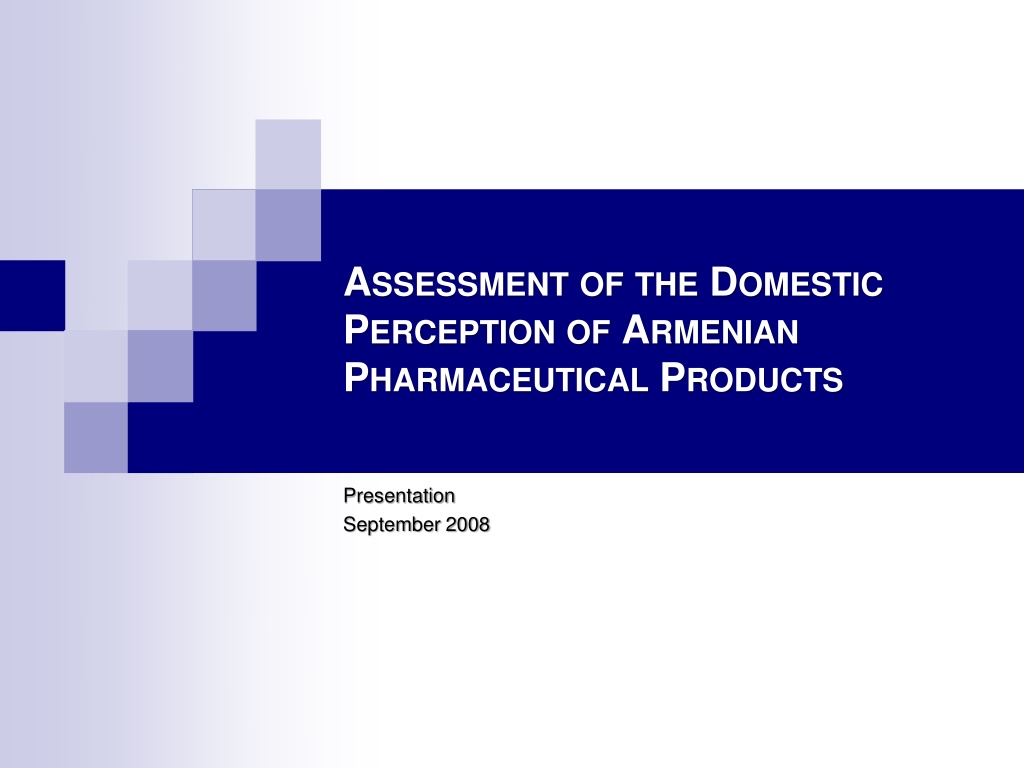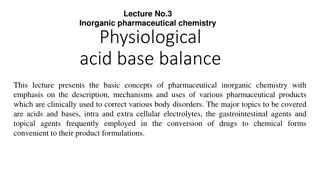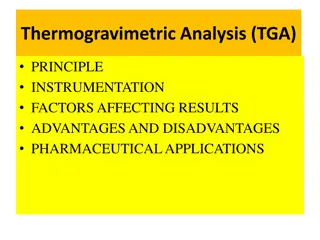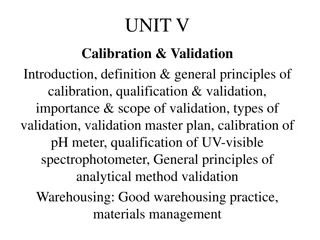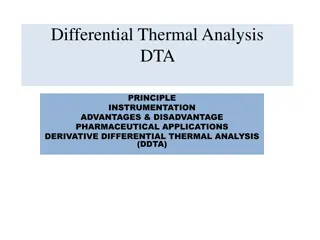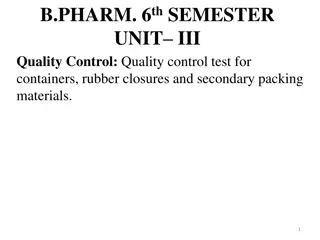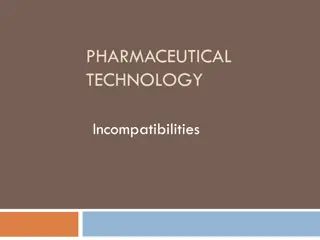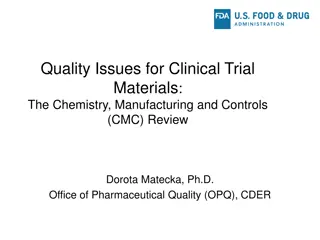Assessment of Armenian Pharmaceutical Products Perceptions
This presentation from September 2008 delves into the domestic perception of Armenian pharmaceutical products, covering consumer profiles, awareness, perception, behavior, and concluding recommendations. The assessment, implemented by USAID CAPS Project and AM PARTNERS Consulting Company, includes objectives focusing on consumers, clinic procurers, physicians, pharmacy managers, and pharmacists. Sampling and geographical details are also provided, highlighting consumer profiles in Yerevan versus Marzes. The comparison shows a distribution of 53% respondents from Yerevan and 47% from Marzes.
Download Presentation

Please find below an Image/Link to download the presentation.
The content on the website is provided AS IS for your information and personal use only. It may not be sold, licensed, or shared on other websites without obtaining consent from the author. Download presentation by click this link. If you encounter any issues during the download, it is possible that the publisher has removed the file from their server.
E N D
Presentation Transcript
ASSESSMENT OF THE DOMESTIC PERCEPTION OF ARMENIAN PHARMACEUTICAL PRODUCTS Presentation September 2008
CONTENT INTRODUCTION CHAPTER 1 - Consumer Profile CHAPTER 2 - Respondents Awareness CHAPTER 3 - Respondents Perception CHAPTER 4 - Respondents Behavior CHAPTER 5 - Conclusions and Recommendations
Assessment of the Domestic Perception of Armenian Pharmaceutical Products ASSESSMENT IMPLEMENTATION Initiated by USAID CAPS Project Implemented by AM PARTNERS Consulting Company Period April-July 2008
Assessment of the Domestic Perception of Armenian Pharmaceutical Products THE CLUSTER OF HEALTH CARE Regulating authority Educational institutions Newspapers and magazines Health care NGOs Charitable organizations 61 licensed importers Distributors Producers State and private clinics Pharmacies Ministry of Health of RA > 10 ~ 20 > 20 ~ 10 61 > 20 17 751 1105
Assessment of the Domestic Perception of Armenian Pharmaceutical Products ASSESSMENT OBJECTIVES AND OBJECTS Assessment OBJECTIVES Assessment OBJECTS 1. Consumers Assessment of the consumers awareness level about the Armenian pharmaceuticals 2. Procurers at clinics Assessment of the consumers perception towards the Armenian pharmaceuticals 3. Physicians 4. Pharmacy managers Assessment and presentation of consumers (buyers ) behavior peculiarities 5. Pharmacists
Assessment of the Domestic Perception of Armenian Pharmaceutical Products ASSESSMENT SAMPLING AND GEOGRAPHY Assessment SAMPLING Assessment GEOGRAPHY
Chapter 1 CONSUMER PROFILE
Assessment of the Domestic Perception of Armenian Pharmaceutical Products CONSUMERS PROFILE COMPARISON Yerevan vs. Marzes --------------------------------------------------- --- 53% (205 persons) of respondent consumers were from Yerevan, 47% (179 persons) of respondent consumers were from Marzes (regions) 57% of respondents from Yerevan have had higher education, 27% - secondary education 31% of respondents from Marzes have had higher education, 45% - secondary education
Assessment of the Domestic Perception of Armenian Pharmaceutical Products CONSUMERS PROFILE Consumers ENGAGEMENT Consumers PROFESSIONS
Assessment of the Domestic Perception of Armenian Pharmaceutical Products CONSUMERS PROFILE
Assessment of the Domestic Perception of Armenian Pharmaceutical Products THE PROFILE OF CLINICS AND THEIR REPRESENTATIVES 74 assessed clinics, including 41 (55%) state entities and 33 (45%) private entities ------------------------------------------------------------------------------------------------------------------------------------------------------------------------ Ways of pharmaceuticals procurement 43% of clinics procure the major part of pharmaceuticals through the system of government purchases. 50% of clinics procure all pharmaceuticals through direct purchases. These are private entities. Sources of pharmaceuticals procurement 73% of clinics procure the major part of pharmaceuticals from importers. 82% of clinics do not procure pharmaceuticals from producers. 99% of clinics do not import pharmaceuticals. 85% of clinics do not procure pharmaceuticals from pharmacies.
Assessment of the Domestic Perception of Armenian Pharmaceutical Products THE PROFILE OF CLINICS AND THEIR REPRESENTATIVES 2. Procurers of pharmaceuticals at clinics
Assessment of the Domestic Perception of Armenian Pharmaceutical Products THE PROFILE OF CLINICS AND THEIR REPRESENTATIVES 3. Physicians
Assessment of the Domestic Perception of Armenian Pharmaceutical Products THE PROFILE OF PHARMACIES 85 assessed pharmacies. 9.4% of them are included in pharmacy networks
Assessment of the Domestic Perception of Armenian Pharmaceutical Products THE PROFILE OF PHARMACIES 4. Pharmacy managers
Assessment of the Domestic Perception of Armenian Pharmaceutical Products THE PROFILE OF PHARMACIES 5. Pharmacists
Chapter 2 RESPONDENTS AWARENESS
Assessment of the Domestic Perception of Armenian Pharmaceutical Products AWARENESS - Armenian Pharmaceutical Production 1. Consumers 23% of consumers know at least 1 Armenian pharmaceutical. Meantime, 77% of consumers could not name any pharmaceutical. So-called aware consumers named 173 types of products. Among consumers those types of pharmaceuticals, which are mostly available in any house are most popularity is taken by. These are mainly pharmaceuticals normally used without physician s prescription or for the first medical aid
Assessment of the Domestic Perception of Armenian Pharmaceutical Products AWARENESS - Armenian Pharmaceutical Production 3. Physicians 96% of physicians are aware of at least 1 Armenian pharmaceutical. 1 physician knows names of 4.6 pharmaceuticals on average. Dentists are not usually aware of Armenian pharmaceuticals. Pharmaceuticals familiar to physicians are produced - 24% - by Liqvor; - 19% - by Arpimed; - 10% - by Yerevan CPF.
Assessment of the Domestic Perception of Armenian Pharmaceutical Products AWARENESS - Armenian Pharmaceutical Production 5. Pharmacists All pharmacists know more than 10 Armenian pharmaceuticals. The awareness high level of pharmacists is conditioned by their professional responsibilities. They have to know names of pharmaceuticals that they sell everyday. Pharmaceuticals familiar to physicians are produced - 39% - by Arpimed; - 19% - by Esculap; - 16% - by Liqvor.
Assessment of the Domestic Perception of Armenian Pharmaceutical Products SOURCES OF INFORMATION - Armenian pharmaceutical production
Assessment of the Domestic Perception of Armenian Pharmaceutical Products AWARENESS Armenian Producers 1. Consumers Only 11 out of 384 respondents were able to recall any Armenian producer of pharmaceuticals without an aid. Those 11 respondents together named only 7 Armenian producers of pharmaceuticals. Additional 25 consumer respondents recalled 1-2 more producers after the aid. Others know no Armenian producer of pharmaceuticals. Even if some consumer respondents know any producer of pharmaceuticals, they don t know the types of pharmaceuticals they manufacture.
Assessment of the Domestic Perception of Armenian Pharmaceutical Products AWARENESS Armenian Producers 2. Procurers of pharmaceuticals at clinics 3. Physicians
Assessment of the Domestic Perception of Armenian Pharmaceutical Products AWARENESS Armenian Producers 5. Pharmacists 4. Pharmacy managers
Assessment of the Domestic Perception of Armenian Pharmaceutical Products SOURCES OF INFORMATION - Armenian Producers 1. 3 main sources of information on Armenian pharmaceuticals producers among consumers Only 10% of consumers could tell the source of the information about Armenian producers of pharmaceuticals. The link between producers and consumers in the market of pharmaceuticals is very weak, or even does not exist at all.
Assessment of the Domestic Perception of Armenian Pharmaceutical Products SOURCES OF INFORMATION - Armenian Producers 2. 3 main sources of information on Armenian pharmaceutical producers among procurers of pharmaceuticals at clinics
Assessment of the Domestic Perception of Armenian Pharmaceutical Products SOURCES OF INFORMATION - Armenian Producers 3. 3 main sources of information on Armenian pharmaceutical producers among physicians
Assessment of the Domestic Perception of Armenian Pharmaceutical Products SOURCES OF INFORMATION - Armenian Producers 4. 3 main sources of information on Armenian pharmaceutical producers among pharmacy managers
Assessment of the Domestic Perception of Armenian Pharmaceutical Products SOURCES OF INFORMATION - Armenian Producers 5. 3 main sources of information on Armenian pharmaceutical producers among pharmacists
Chapter 3 RESPONDENTS PERCEPTION
Assessment of the Domestic Perception of Armenian Pharmaceutical Products PERCEPTION Consumers experience in using Armenian pharmaceuticals Respondents experience in use of pharmaceuticals could be considered as the most objective basis for the formation of respondents perception Quantity of pharmaceuticals bought per purchase Frequency of consumers visits to pharmacies during January-April 2008
Assessment of the Domestic Perception of Armenian Pharmaceutical Products PERCEPTION Consumers experience in using Armenian pharmaceuticals 36% of respondents visited pharmacies only once during last 4 months, and 29%- 2-5 times These people cannot be considered as quite experienced in buying pharmaceuticals. This fact decreases their opportunities of getting information about Armenian pharmaceuticals. This means, it will be very difficult for unaware consumer to judge objectively about Armenian pharmaceuticals. 53% of consumers does not know whether they have ever purchased Armenian pharmaceuticals. Another 21% declared that never purchased Armenian pharmaceuticals. This means that only 26% of consumers have real (conscious) experience o f consuming Armenian pharmaceuticals. Consumers form their perception towards Armenian pharmaceuticals based on opinions and advice of friends, relatives, physicians, pharmacists, instead of basing on their own experience.
Assessment of the Domestic Perception of Armenian Pharmaceutical Products PERCEPTION Practices of purchasing the Armenian pharmaceuticals at clinics 2. Procurers of pharmaceuticals at clinics 3. Physicians 84% of physicians declared, that they use or prescribe Armenian pharmaceuticals in their practice. 84% of Procurers at clinics declared their purchases of Armenian pharmaceuticals for the needs of their entity. The most demanded pharmaceuticals are infusion solutions, antibiotics, lidokayin, and vitamin complexes. The majority of procured Armenian pharmaceuticals are products of Liqvor, PharmaTech, and Arpimed. The number of physicians that do not trust to Armenian pharmaceuticals prevails, although in many cases there is no reason for that distrust. Dental clinics comprise the majority of entities that are not purchasing Armenian pharmaceuticals, at all.
Assessment of the Domestic Perception of Armenian Pharmaceutical Products PERCEPTION Practices of purchasing the Armenian pharmaceuticals at pharmacies There is no pharmacy in Armenia that did not or currently does not sell Armenian pharmaceuticals In case of pharmacies one may notice the approach applied by commercial entities: the larger the nomenclature and opportunities for choice, the more clients and attendance Top 5 Armenian pharmaceuticals sold by PHARMACISTS Top 5 Armenian pharmaceuticals purchased by PHARMACY MANAGERS for selling at the pharmacy
Assessment of the Domestic Perception of Armenian Pharmaceutical Products PERCEPTION / The importance of pharmaceuticals origin 1. Consumers Low level of their awareness does not allow consumers make sound/justified inferences. Consumers that have formed preferences usually prefer imported pharmaceuticals Consumers who usually prefer imported pharmaceuticals justify their choice with following main reasons: Imported pharmaceuticals are more trustful and of higher quality; Imported pharmaceuticals are more efficient; Reliability of imported pharmaceuticals is proven by the experience.
Assessment of the Domestic Perception of Armenian Pharmaceutical Products PERCEPTION - IMPORTANCE OF THE ORIGIN 2/3. Representatives of clinics Those representatives of clinics who prefer imported pharmaceuticals (31%) tell that: Imported pharmaceuticals are of much better quality and are more efficient than Armenian pharmaceuticals Their devotion towards imported pharmaceuticals the representatives of clinics justify by the following reason: They have no right to make experiments on patients health and prescribe inefficient Armenian pharmaceuticals, providing the availability of high quality imported pharmaceuticals
Assessment of the Domestic Perception of Armenian Pharmaceutical Products PERCEPTION - IMPORTANCE OF THE ORIGIN 4/5. Pharmacists Pharmacists are evaluating the importance of the origin of pharmaceuticals from not only professional viewpoint, but also from the commercial aspect. For the 54% of pharmacists the origin of pharmaceuticals does not matter. They prefer such factors as liquidity, demand and sales volumes of pharmaceuticals. 5% of pharmacists prefer Armenian pharmaceuticals due to patriotic feelings. These pharmacists would like to promote Armenian product and assist the Armenian producer, since their development will contribute the development of the Armenian economy.
Assessment of the Domestic Perception of Armenian Pharmaceutical Products PERCEPTION - QUALITY, PRICE, PACKAGING, AVAILABILITY Ranking tool Share of non-relies (those who could not estimate/rank)
Assessment of the Domestic Perception of Armenian Pharmaceutical Products PERCEPTION - QUALITY, PRICE, PACKAGING, AVAILABILITY 1. Consumers Consumers who were able to make comparative ranking: 36% of respondents relied on their own experience; 24% of respondents made ranking based on advice of their friends and relatives; 17% of respondents made ranking based the impression received from various medical and promotional TV programs 11% of respondents made ranking based advice of physicians and pharmacists Other respondents were not able clearly note the bases of their ranking
Assessment of the Domestic Perception of Armenian Pharmaceutical Products PERCEPTION - QUALITY, PRICE, PACKAGING, AVAILABILITY 2. Procurers at clinics 3. Physicians
Assessment of the Domestic Perception of Armenian Pharmaceutical Products PERCEPTION - QUALITY, PRICE, PACKAGING, AVAILABILITY 4. Pharmacy managers 5. Pharmacists
Assessment of the Domestic Perception of Armenian Pharmaceutical Products PERCEPTION - VALUES OF DIFFERENT CHARACTERISTICS 2. Procurers at clinics
Assessment of the Domestic Perception of Armenian Pharmaceutical Products PERCEPTION - VALUES OF DIFFERENT CHARACTERISTICS 4. Pharmacy managers
Chapter 4 CONSUMERS BEHAVIOR
Assessment of the Domestic Perception of Armenian Pharmaceutical Products BEHAVIOR - CONSUMERS Sooner or later each consumer has to buy pharmaceuticals (frequently or rarely), there is always a second agent (individual), who usually gives advice. Groups of advisors that direct consumers purchase of pharmaceuticals independently from whose and which kind of advices are used by consumers to make a decision on purchasing pharmaceuticals, there is a group of people whose advice or opinion has exceptional importance and meaning for consumers. These people are physicians.
Assessment of the Domestic Perception of Armenian Pharmaceutical Products BEHAVIOR - CONSUMERS Factors affecting the decision of purchasing pharmaceuticals and their importance The most important factor affecting the consumers decision is the physicians guarantee (advice). Physicians do know about this propensity towards their advice and usually get benefits from that. 34% of consumers stated that they had situations when physicians prescribed a medication and advised that the pharmaceuticals of particular producer or particular origin must be bought . 5% of consumers always and 39% - very often face this kind of situations. Explanation of ranks 3 - very important 2 - important 1 - unimportant
Assessment of the Domestic Perception of Armenian Pharmaceutical Products BEHAVIOR - CONSUMERS How consumers deal with these situations? 88% of them follow physicians advice; 5% is getting upset and consults with other physicians; 3% also consults pharmacists and other specialists; Others do not have clear behavior. 83% try to find the pharmaceuticals in other pharmacies, or contact other individuals, even relatives that live abroad; 14% of consumers are inclined to substitute the prescribed pharmaceuticals with analogues. What consumers do when they do not find the prescribed pharmaceuticals at pharmacy?
Assessment of the Domestic Perception of Armenian Pharmaceutical Products BEHAVIOR - REPRESENTATIVES OF CLINICS 93% of officials responsible for purchase of pharmaceuticals at clinics state that none of the institution managers interfere the process of fulfilling professional duties by physicians. At clinics physicians have such freedom of actions, which automatically makes them one of the most important players in the process of pharmaceuticals circulation within and out of clinics. Many participants of the pharmaceuticals market, including producers, confirmed that at clinics cases of cooperation between suppliers of pharmaceuticals and physicians is very common. Physicians are motivated by suppliers of pharmaceuticals to write prescriptions and give advice that contribute or promote sales of the motivator s production. According to some experts, physicians that are closing deals with suppliers, are break ing norms of morality, since pharmaceuticals have direct relation to people s health, and therefore, physicians should prescribe the most efficient pharmaceuticals, rather than the ones sales of which make profit to him/her. BUT IS THAT TRUE? WHAT PHYSICIANS SAY?
Assessment of the Domestic Perception of Armenian Pharmaceutical Products BEHAVIOR - REPRESENTATIVES OF CLINICS 89% of physicians did not reject the fact of cooperation with suppliers of pharmaceuticals. 62% of physicians did not reject that they direct their patients in purchasing pharmaceuticals of certain origin and producer. ---------------------------------------------------------------------------------------------------------------------------------------- The existence of Physicians - importers/producers cooperation was completely rejected by 77% of Procurers at clinics. Instead, the rest or 23% did not exclude the possibility of existence of this relation. We might conclude that suppliers of pharmaceuticals to clinics created relationships at the level of Procurers at clinics, which allows through efforts of the latter promote sales of their own production.
